- Home
- Susan Howatch
The Shrouded Walls
The Shrouded Walls Read online
THE SHROUDED WALLS
Susan Howatch
“We were seventeen when our parents died ... Alexander and I did not realise at first that we were destitute. It was Sir Charles Stowell, a friend of my father’s who finally told us the my father's fortunes and estates, including even the town house in London where we had lived all our lives with our mother, had reverted to my father’s wife in Manchester. My father had been much too gay and carefree to bother to make a will to provide for his mistress and the twins she had borne him...” When her parents die in a road accident, Marianne, illegitimate daughter of a French émigrée and an English gentleman, loses her home and all her worldly goods. She faces life as a governess until she meets Axel Branson, a man who must marry within the year in order to inherit his father's wealth. Marianne grabs at the chance of a respectable marriage. A remote house in the Kent Marshes is now her home. But distrust of her husband and fear of the house seem to roll in as steadily as the sea mist...
ONE
We were seventeen when our parents died. Alexander was away at school in Harrow and I had just begun my last term at Miss Shearing’s Academy for Young Ladies in Cheltenham, so neither of us was at home. My father had had an extravagant turn at the Races, drunk too much whisky and then had insisted on taking the reins himself from the coachman and had driven full-tilt across Epsom Downs before misjudging the bend of the road as it sloped to Tattenham Corner. My mother, who was with him, died instantly and my father himself only lived for seven hours afterwards. The tragedy was the talk of society, for our father was a prominent member of Parliament, a gentleman with a country seat in Lancashire and a considerable fortune invested in the cotton mills of Manchester, while our mother was an émigrée from the bloodbaths of the French Revolution, a daughter of an aristocrat whom Robespierre had sent to the guillotine.
Alexander and I did not at first realize we were destitute. It was Sir Charles Stowell, a friend of my father’s who finally told us that my father’s fortune and estates, including even the town house in London where we had lived all our lives with our mother, had reverted to my father’s wife in Manchester. My father had been much too gay and carefree to bother to make a will to provide for his mistress and the twins she had borne him. I could almost hear him saying: “Wills? That’s a damned sordid topic of conversation! Who wants to think about death anyway?” And he would have gone on just as before, never once stopping to think that although he himself did not care what happened after his death, there were other people who cared a great deal.
I certainly cared. I cared all the way up to London from Miss Shearing’s Academy in Cheltenham, at the inns where we changed horses and stopped to eat, on the rough roads muddy beneath the rain of an English October. I cared when I reached my home, the elegant town house in Soho which my father had bought for my mother’s comfort and luxury but never given to her, I cared when I saw the servants whom he had installed to attend our needs, I cared when I saw all the thousand and one other things which now belonged to the middle-aged widow secure in her country home in Lancashire. And most of all I cared when I went to Lincoln’s Inn with Alexander to see Sir Charles Stowell and sat in his chambers where the walls were lined with legal books, and the lawns in New Square beyond the window were flaked with autumn leaves.
“But who is to pay for my school fees at Harrow?” said Alexander blankly to Sir Charles. “I have another year’s study to complete there.”
“My dear sir,” said Sir Charles, who was the smoothest, the most charming and the most realistic of barristers-at-law. “I’m afraid you won’t be returning to Harrow.”
Alexander still could not grasp the full implications of his predicament. “But I wanted to study at Oxford,” he exclaimed hotly. There was a fractious edge to his voice now which I knew and recognized. He had begun to be frightened. “What’s to happen to my education?”
“I sympathize,” said Sir Charles blandly, “but may I—since we are being so frank with each other—be so discourteous as to remind you that you are fortunate to have received any education at all? Your situation, sir, could be infinitely worse. Fortunately your sister has completed five years at that admirable establishment for young ladies in Cheltenham and will be qualified to seek a position as a governess. As a long-standing friend of your father’s I will of course exert what influence I possess to help her obtain employment, but I trust you realize, miss,” he added to me, “that your social position is not one which a good family will lightly overlook. However, there are wealthy merchant families who are anxious to employ young females brought up in a ladylike environment, and I dare say something suitable can be arranged. As for you, sir, I can only recommend that you enlist in the army, for you are far too young to be considered as a tutor and you are certainly not qualified to pursue any profession.”
“I don’t want to enlist in the army,” said Alexander. He was white-faced now, very frightened indeed. “I don’t want to be a soldier.”
Sir Charles looked as if he might say ‘Beggars can’t be choosers,’ but fortunately thought better of it. Instead he gave a regretful little smile, waved his hand in a vague gesture of sympathy and refrained from comment.
“May I ask you a question, Sir Charles?” I said.
“Certainly.” He turned his advocate’s eyes instantly in my direction. They were very dark and lustrous, and I noticed how his glance seemed to linger on my mouth and the line of my nose before he allowed his eyes to meet mine.
I could almost hear my mother say with contempt: “Men are interested in one thing and one thing only where women such as you or I are concerned. And the more well-bred and righteous the man, the more interested he will be. Let no one fool you.”
“How much money do we have now?” I asked him courteously. “This moment, I mean.”
“Twenty-five pounds was discovered among your mother’s effects; then her jewelry will belong to both of you, and her clothes, and sundry other articles which may be established as gifts from your father to your mother. The house, of course, belongs to Mrs. Cavendish and the responsibility of dismissing and paying the servants will be hers whenever she decides to sell it.”
“So in fact we have a little money.”
“Enough,” agreed Sir Charles, “to keep you until you have found positions for yourselves. That’s true.”
“Thank you,” I said. “And how soon must we leave the house?”
“Mrs. Cavendish has requested that you leave it as soon as possible. Her eldest son—your father’s heir—Mr. Michael Cavendish is at present en route to London from Manchester to settle your father’s business affairs here. I understand he is to organize the sale of your mother’s house.”
“I see.” My father had talked to us of Michael. “Dull as his mother,” he had said, “and twice as pompous.” Richard had been his favorite. Richard was the second son. Then there were the four daughters, but they were all older than us as my parents had not met one another until after Mrs. Cavendish’s last child had been born. It was strange to think of our half-brothers and half-sisters whom we had never met and even stranger to think of my father having another home in addition to the town house in Soho. He had always seemed to belong to us so completely that the very knowledge that we had always shared him seemed unreal and absurd. Only once had I caught a glimpse of the reality that my mother never forgot, and that was long ago when I was a child and had tip-toed from my bedroom to see them leave the house for an evening at Vauxhall. They had quarreled in the hall in front of the footman. I could still recall the poor footman, his ears pink with embarrassment, as he had stood stiffly by the front door and pretended not to hear my mother cry: “Does it never occur to you that I may be tired of going to Vauxhall and hear all the aristocra
tic gossipmongers of London society whisper: ‘There goes Mark Cavendish with his blue-blooded French whore?’ Does it never occur to you that I might be tired of being ostracized from the circles where I was once accepted and recognized? You—you with your knowledge of London society—is it so impossible for you to visualize how it is to be not just a woman of standing engaged in an indiscreet affair but a man’s kept mistress who has borne him two illegitimate children?”
My mother was always bitter. She could remember too clearly her life in the huge French chateau on the Loire and her brilliant match to the young Duc de Fleury just before the revolution. The London of the turn of the century in which she had found herself widowed and penniless some years later was very different from the world of the ancien regime from which she had come. “Émigrés were two a penny,” she had told us once, “and if one could not pay the rent the English didn’t care how much land one’s father had once owned in France. Titles meant nothing at all. Nothing mattered except money, and we were all penniless. How can children like you ever understand? I had never handled money in my life! I was accustomed to ease and riches and luxury, and suddenly I was in a garret in Bloomsbury carrying pitchers of water up six flights of stairs and haggling with the butcher for a cheap portion of beef.”
She had started sewing to try to earn money. She had first met Mark Cavendish when she had been altering an evening gown for his wife. Within two weeks she had escaped from the garret in Bloomsbury, the six flights of stairs, the cheap portions of beef. Her one great fear was always losing everything a second time to sink back into the hideousness of poverty, and during the twenty years she spent as my father’s mistress she never lost this dreaded feeling of insecurity.
“Anything is better than poverty,’’ she told us again and again. “Anything.” Even being called Mark Cavendish’s whore.
“I understand your father,” she had said. “I’ve no illusions about him—or about any other man. I have a pleasant house, sufficient servants, good clothes and my children are well-cared for. Why should I indulge in complaints and regrets? Mark is generous, gay, good-humored and good-looking. What more can a woman expect of a man?”
Kindness, I might have said. Compassion, Understanding. But I said nothing. It was hardly for me to point out that my father was as hard as diamonds, a man who drank hard, gambled hard, rode hard and worked hard. Hard people seldom think of others, not because they deliberately wish to be selfish, but because they are incapable of visualizing anyone else’s feelings but their own. My mother might deceive herself because she preferred not to face the truth but I saw all too clearly that for him she was too often a mere convenience, a diversion whom he could always turn to whenever he was tired of his political intrigues at Westminster, his racing at Epsom or his gambling circles in Mayfair.
I never liked him.
Curiously enough I was always the one to whom he seemed the most attached. “Of all my children,” he told me once, “I do believe you’re the one who’s most like me.”
Which, considering my opinion of him, I could hardly regard as a compliment.
“Well now, Miss Fleury,” said the lawyer, bringing me back abruptly to that book-lined room in Lincoln’s Inn with the green lawns outside in the square. “If there are any further ways in which I can assist you, please be so good as to let me know. If you wish for any references while seeking a position as a governess—”
“Thank you, Sir Charles,” I said, “but I have no intention of being a governess.” I rose to my feet, and the men rose too, Alexander moving the chair so that it would not catch my dress and then assisting me to don my pelisse. “I’m most indebted to you for all your trouble, Sir Charles,” I added to him with my most charming smile. “You’ve been more than kind.”
“My pleasure, Miss Fleury. Please remember that if you should want any further assistance I am always at your disposal.” He smiled back into my eyes, making his meaning explicitly clear.
“Thank you,” I said. “Good-day.”
“Thank you, sir,” muttered Alexander, and hurried to open the door for me.
I swept through without a backward glance and outside in the office beyond the little clerk leaped off his stool to open the door which led out into the square. It was a beautiful day. The sky was blue and cloudless and a light breeze danced through the trees. My mother, who hated English weather, would have said it reminded her of France and the gardens of the chateau on the Loire.
“Oh God,” said Alexander desolately.
“Be quiet,” I snapped. I was too close to tears myself to stand any nonsense from him. The hired chaise was still waiting at the gates of Lincoln’s Inn and presently we were on our way home to Soho.
“What are you going to do?” said Alexander at last.
“I don’t know.” I stared out of the window at the crowded dirty streets, saw the beggars rattling their alms bowls and the prostitutes already soliciting in the alleys.
“I don’t want to go into the army,” said Alexander.
I did not answer.
“Perhaps Michael would help us. After all, he is our half-brother.”
I looked at him. He blushed. “I—it was just an idea...”
“A very bad one.” I went on looking out of the window. “And totally unrealistic.”
Presently he said: “You won’t have to worry. You’ll soon get married, and your problems will be solved. But what about me? How am I to earn a living and support myself? I don’t know what to do.”
“I should like to know who is going to marry the illegitimate child of an English gentleman and a French émigrée without dowry, portion or social standing,” I said acidly. “Please try to talk sense, Alexander, or else don’t talk at all.”
We traveled the rest of the way home in silence. Soon after we arrived it was time for dinner, and we ate our way wordlessly through the plates of fish, fowl, mutton and beef in the paneled dining room. Above the fireplace our father’s portrait smiled down at us, the ironical twist to his mouth seeming a shade more pronounced than usual.
“Perhaps Michael will be here tomorrow,” said Alexander.
I was silent.
“Perhaps he will be quite a pleasant fellow.”
A clock chimed the hour and was still.
“Perhaps I shall ask him if he can help us.”
“If you say perhaps once more, Alexander—” I began and then stopped as the footman came in.
“Yes, what is it, John?”
“There is a gentleman here to see you, miss. He gave me a letter for you and his card, and I showed him into the library.”
I took both card and letter from the salver.
“Michael?” said Alexander at once.
“No, it’s not Michael.” I stared at the card. The name was unfamiliar to me. “I have never heard of this gentleman, John.”
“Perhaps the letter, miss—”
“Nor am I in the habit of entertaining strangers known only to me through a letter of introduction.”
“Let me see him,” said Alexander, standing up. “I’ll find out what he wants. Perhaps he’s a creditor.”
“Pardon, sir,” said the footman scandalized, “but he was most definitely a gentleman.”
“Nonetheless—”
“Wait,” I said. I had opened the letter. The address was New Square, Lincoln’s Inn, and the signature at the foot of the page belonged to the lawyer, Sir Charles Stowell. “My dear Miss Fleury,” Sir Charles had written. “I hope you will forgive me for taking the liberty to introduce to you by means of this letter an esteemed client of mine, Mr. Axel Brandson. Mr. Brandson, though resident in Vienna, has visited this country many times and as well as being well known to me personally was also slightly acquainted with your father whom he had met during a prior visit to London. On hearing of your bereavement, Mr. Brandson expressed anxiety to offer his condolences and as I was mindful of your present unfortunate predicament it occurred to me that it might perhaps be beneficial if an opport
unity could be arranged for him to meet you. I offered to act as intermediary in this respect but Mr. Brandson is hard-pressed by business commitments and it was impossible for us to arrange a suitable time at an early date. Hence I hope that this letter will serve as sufficient introduction to his social position and personal integrity. I remain, etc...”
I looked up. The footman was still waiting. “Kindly inform Mr. Brandson, John,” I said, “that I will see him shortly, if he would be so kind as to wait a few minutes.”
“Yes, miss,” said the footman, and withdrew.
“Who is it?” said Alexander immediately.
I gave him the letter.
“But what does he want?” he said mystified when he had finished reading. “ I don’t understand.”
But I was remembering the expression in Sir Charles’ dark eyes and the knowledge he had of my predicament and background, and thought I understood all too well. I rose to my feet, trying not to be angry. Sir Charles probably intended well enough. After all I had told him directly I had no intention of being a governess and he had no doubt assumed this declaration to be capable of only one possible interpretation. What else could a woman in my position do if she refused to be a governess? She could only marry, and as no man of any standing would want me for a wife, even that course was denied me.
“Are you sure you should see him alone?” Alexander was saying alarmed. “I’d better come with you. The man’s a foreigner, after all.”
“So was Mama,” I reminded him, “and most of her friends. No, I’ll see him alone.”
“But do you think it’s proper?”
“Probably not, but I don’t think that matters so much now.” I went out into the hall. In spite of myself I was angry and my pride burned within me like a flame no matter how hard I tried to subdue it by the cool persuasiveness of reason. In a moment of rage I wished the devil would swallow up Mr. Brandson, and Sir Charles Stowell too. I was determined not to make the same mistakes my mother had made no matter how many London garrets I had to spend my days in.

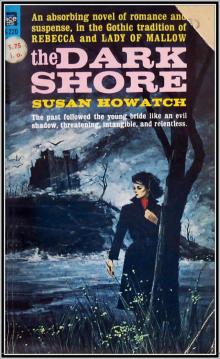 The Dark Shore
The Dark Shore Sins of the Fathers
Sins of the Fathers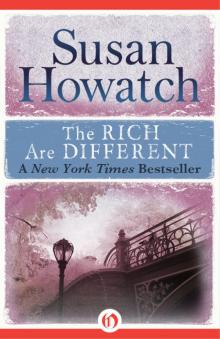 The Rich Are Different
The Rich Are Different The Shrouded Walls
The Shrouded Walls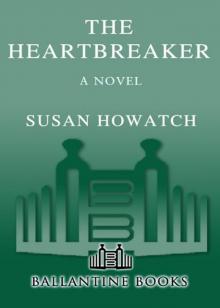 The Heartbreaker
The Heartbreaker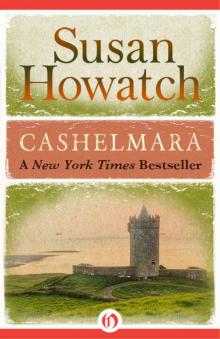 Cashelmara
Cashelmara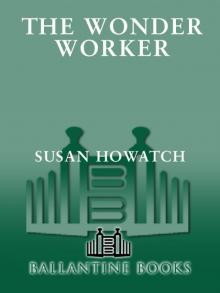 The Wonder Worker
The Wonder Worker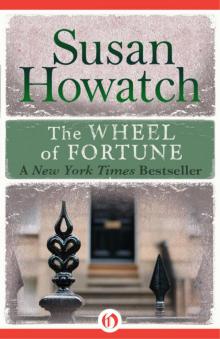 The Wheel of Fortune
The Wheel of Fortune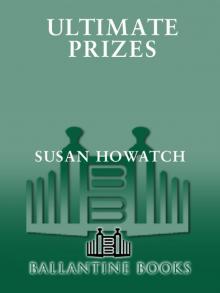 Ultimate Prizes
Ultimate Prizes Penmarric
Penmarric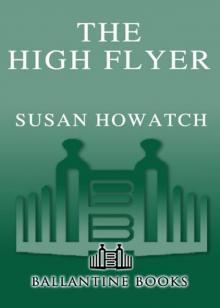 The High Flyer
The High Flyer